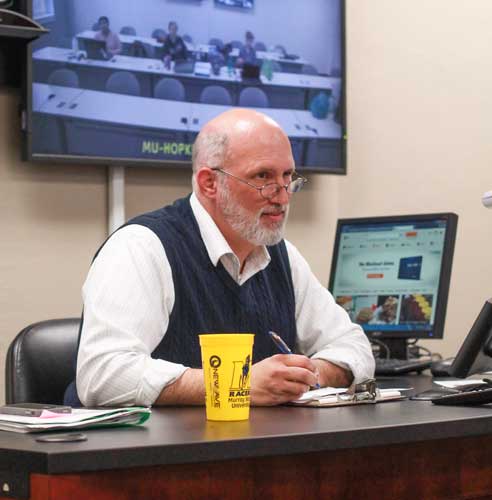
Jeff Wylie, senior lecturer for the College of Education and Human Services, speaks to students in his class who will later evaluate the course.
The Student Government Association discussed the possibility of online course evaluations instead of the paper system currently in use in its Feb. 24 meeting.
The possibility is no more than a talking point right now, said Jeanie Morgan, SGA adviser of student activities. This is not the first time this topic has come up.
Discussions of professor evaluations produced controversial outcomes in the past, Morgan said.
In 1998, former SGA President Todd Earwood gathered data for professors across every department of the university. This document, called The SGA Source, reported average percentages of letter grades professors gave students in each course taught by that professor, Morgan said.
The SGA Source caused controversy on campus, as some professors felt their privacy was violated, she said.
The publication was intended to help students understand how each professor graded and give an indication of their difficulty level, much like modern systems such as RateMyProfessor.com, Morgan said.
Carrie Jerrell, assistant professor of English, said evaluations are important for professors, but especially important for the University as a whole.
“Maybe what would be better is for us to have a larger conversation about what we think evaluations really are for students and teachers,” Jerrell said.
An issue discussed with online evaluations is whether or not students would take the time to complete them.
Joshua Hitz, senior from Staunton, Ill., said the University could do a number of things to encourage students to share their opinions outside of paper surveys.
“I think it would be a good change to move the evaluations online,” Hitz said. “People may be more inclined to fill them out since they are on the internet, but I think students would forget to fill them out without some kind of incentive.”
Jerrell said she takes time to explain to her students how seriously she takes the feedback, but has never given extra motivation for students to fill them out.
Other universities currently utilize the Internet to gather students’ responses. University of Louisville and University of Kentucky use online systems, and each university deals with their own system of rewards for student comments.
According to the university’s website, evaluations at Louisville are only accessible online. The university encourages students to participate by offering the chance to win $250 in credit toward books if completed by a certain date.
University of Kentucky offers both paper and online evaluations. Rebecca Clements, junior at Kentucky, said some professors give students extra credit points for filling out surveys.
“I’ve personally never had a teacher give extra points for filling out evaluations, but I’ve heard of some teachers that do,” Clements said.
Morgan said the current system will likely remain untouched, something professors like Jerrell would not want.
“It’s not that I don’t think students don’t have a right to evaluate their classroom experience and professors,” Jerrell said. “I’m just not sure bubble sheets are the right way to do it.”
Story by Lucy Easley, Staff writer
MSU has little-if any-regard for student evaluations of teaching effectiveness, unless of course they need to explain away questionable tenure decisions, promotions, raises, or otherwise incidents of otherwise inexplicable professional advancement. During my 5 years teaching @ Murray State, for example, students would routinely explain that they declined to complete the evaluation forms because "nothing is ever done about lousy professors, and good ones are rarely retained because of them." [paraphrase]. I also personally observed senior faculty and administration refuse to consider teaching evaluations unless, of course, they could be used in a discretionary manner to justify otherwise unjustifiable professional advancement or retention decisions. Does anyone with familiarity with MSU really believe any of this will change simply because of a shift to on -line data collection methods? .